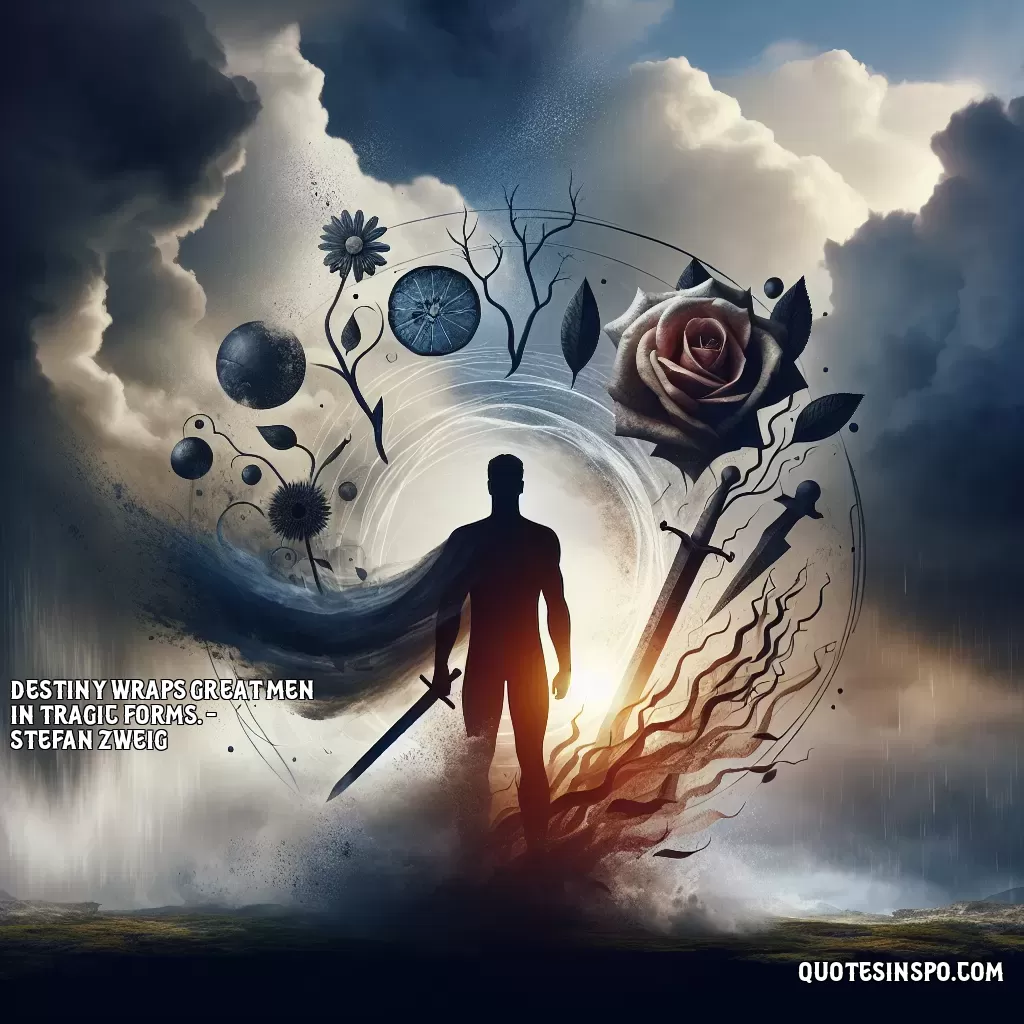
Destiny wraps great men in tragic forms. - Stefan Zweig
Stefan Zweig’s quote, "Destiny wraps great men in tragic forms," suggests that those who achieve greatness often endure significant hardships or tragedies. Zweig, a profound thinker and writer, succinctly encapsulates the paradoxical nature of life, particularly for individuals of noteworthy accomplishments. Great men, in this context, can be interpreted as people who have achieved extraordinary feats, made significant impacts on history, or pushed the boundaries of human potential and understanding. However, Zweig points out that their journeys are seldom straightforward or devoid of suffering. The quote invites us to consider the relationship between greatness and adversity. History is replete with examples that support Zweig’s assertion. Figures such as Alexander the Great, Vincent Van Gogh, Mahatma Gandhi, and Martin Luther King Jr. achieved remarkable successes at great personal cost. Their paths to greatness were marked by significant personal struggles, challenges, or even untimely ends. This association suggests that the very nature of their challenges, which might be seen as tragic, was instrumental in shaping their destiny and, ultimately, their legacy. In a broader sense, Zweig’s quote is reflective of the human condition. It underscores the idea that profound achievements are often accompanied by sacrifices and hardships. The tragedies experienced by these individuals may have honed their character, deepened their resolve, or given them unique perspectives necessary for their successes. Tragedy, then, is not merely an obstacle but also a component of their path to greatness, shaping and defining their legacy. In essence, Zweig prompts us to acknowledge that the fabric of destiny is woven with threads of both triumph and tragedy, each contributing to the final tapestry of a person’s life and legacy.
Quote By: Stefan Zweig
Stefan Zweig, an influential Austrian writer, was born on November 28, 1881, in Vienna, a vibrant cultural hub of the Austro-Hungarian Empire. Coming from a prosperous Jewish family, Zweig was exposed to literature and the arts from an early age, which fostered his passion for writing. After studying philosophy and literature at the University of Vienna, he began his literary career in the early 1900s, swiftly gaining recognition for his short stories, plays, and biographical studies.
Zweig's works often explore themes of human psychology, love, and the complexities of social relationships, reflecting his deep understanding of the human condition. One of his most famous works, "The World of Yesterday," serves as a poignant memoir that encapsulates the cultural and intellectual life of Europe before World War I. In this autobiographical narrative, Zweig masterfully paints a picture of a lost world, filled with artistic and intellectual vibrancy, highlighting the profound impact of the war on European society. His vivid prose and insightful observations have cemented his reputation as a literary giant.
Throughout the 1920s and 1930s, Stefan Zweig continued to flourish as a writer, producing prolific works that included novellas like "Letter from an Unknown Woman" and his notable biography of Marie Antoinette. His ability to weave narrative depth with historical fact set his biographies apart and garnered him a wide readership across Europe. However, with the rise of fascism and the annexation of Austria by Nazi Germany, Zweig's life dramatically changed. As a Jewish intellectual, he faced persecution and chose to flee Europe, a decision that led him to live in exile in Brazil.
Stefan Zweig's later years were marked by despair over the state of Europe and the loss of his homeland. In 1942, feeling overwhelmed by the devastation of war and the rise of totalitarianism, Zweig tragically took his own life in Petrópolis, Brazil. Despite his untimely death, Stefan Zweig's literary legacy endures, and he remains an essential figure in 20th-century literature, celebrated for his profound psychological insight and his unwavering humanism. His works continue to resonate, reminding readers of the fragility of civilization and the enduring power of the human spirit.